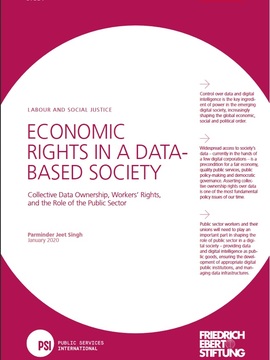- Tags (2)
Video Webinar - Economic rights in a data-based society

Tuesday, 19 May 2020
3pm-4.15pm CET
Our collective future depends on whether we can ensure broad sharing of digital data with due individual and group protection. For the latter, we need to establish collective primary economic rights to data. Access to community data currently held by private actors is the fundamental pre-requisite for the very act of public policy-making and ensuring a fair economy. For the public sector, this entails an imperative to change: it must henceforth be able to collect and curate data, convert it into digital intelligence and provide intelligent public services. While skills development and upgrading are needed, the more decisive challenge is one of visioning, exercising political will and managing a transition to use data for the common good.
Parminder Jeet Singh, Executive Director of IT for Change, presents the key findings of his recent study "Economic rights in a data-based society".
Speakers:
Input: Collective Ownership of Data – An Imperative for a fair post Covid-19 society by Parminder Jeet Singh, IT for Change, India
Comment: Rosa Pavanelli, General Secretary of Public Services International (PSI)
Comment: Christina Colclough, independent expert on the future of work and the politics of technology
Q&A with participants
Moderator: Daniel Bertossa, PSI
- Tags (2)
Economic rights in a data-based society
Digitalization and public services: a labour perspective
Links posted in the chat
Mind the App! - The Covid-19 crisis must not lead to a watering down of human rights and workers’ rights in favor of quick fix solutions by Valerio De Stefano and Christina J Colclough
A 3-Point Agenda for Platform Workers; as if the South Matters -
Wresting power back from platform capitalism by Anita Gurumurthy and Nandini Chami
Worker Info Exchange - Data rights for Digital Workers
We Clock - Give Work a Reality Check
When We Allow Our Devices to Keep Track of our Health, What Do We Give Up? - by Anna Rascouët-Paz
Algorithm Watch - Automated decision-making systems and the fight against COVID-19 by Fabio Chiusi, with the cooperation of Nicolas Kayser-Bri
Les médecins au cœur du circuit de « contact tracing » des patients Covid-19
Protecting privacy on COVID-19 surveillance apps - by Paul Schwartz
MIT Technology Review Covid Tracing Tracker - by Tate Ryan-Mosley
Bits and Pieces - University of Hamburg
How portability of reputation data could lead to a more inclusive labor market - by Martijn Arets
e-Commerce Free Trade Agreements, Digital Chapters and the impact on Labour - A comparative analysis of treaty texts and their potential practical implications - written for the ITUC by Duncan McCann, Senior Researcher, New Economics Foundation
Podcast
Worker intelligence is being outsourced at the workplace by huge corporations using Artificial Intelligence and Big Data. An analysis by Daniel Bertossa of Public Services International and Parminder Jeet Singh (pictured) of IT for Change. Duration: 11'12"



